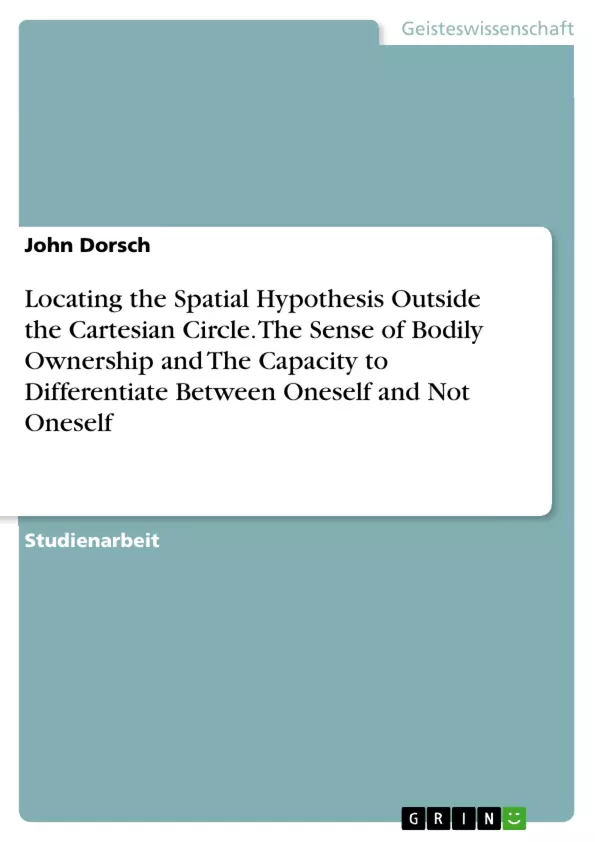The sense of bodily ownership is perhaps the most important aspect to bodily experience. It gives rise to the body`s privilege status as the only object we experience as our own, experienced as subject. But despite how basic this sense is, describing what it is and how it works has been anything but straight-forward. The best explanation for the sense of bodily ownership is arguably the Spatial Hypothesis. It claims that the sense of bodily ownership derives from the spatial representation of the body. Although I support this hypothesis, I argue that past attempts at grounding it risk resulting in a Cartesian circle. I propose a solution distinguishing between capacity and content.
Inhaltsverzeichnis
- 1. The Sense of Bodily Ownership and the Spatial Hypothesis
- 2. Martin's Grounding of the Sense of Bodily Ownership in the Spatial Hypothesis
Zielsetzung und Themenschwerpunkte
Dieser Text befasst sich mit der Frage, wie das Gefühl des Körpers als "meinen eigenen" entsteht und wie die "räumliche Hypothese" dieses Phänomen erklärt. Es wird argumentiert, dass die räumliche Darstellung des Körpers die Grundlage für das Gefühl des Eigentums am eigenen Körper bildet.
- Das Gefühl des Körpers als "meinen eigenen"
- Die räumliche Hypothese als Erklärung für dieses Gefühl
- Die Rolle der räumlichen Darstellung des Körpers
- Die Beziehung zwischen Körperschema und Gefühl des Körpers als "meinen eigenen"
- Die Bedeutung multimodaler Repräsentationen des Körpers
Zusammenfassung der Kapitel
1. The Sense of Bodily Ownership and the Spatial Hypothesis
Das Kapitel untersucht die besondere Rolle des Körpers in der menschlichen Erfahrung und die Frage, wie das Gefühl des Körperbesitzes entsteht. Es wird argumentiert, dass das Gefühl des Körpers als "meinen eigenen" von der räumlichen Darstellung des Körpers abhängt und nicht von reinen Körpersensationen. Die räumliche Hypothese wird vorgestellt, die besagt, dass die räumliche Komponente der Wahrnehmung die Grundlage für das Gefühl des Körpers als "meinen eigenen" bildet. Es werden drei Gründe angeführt, warum die räumliche Hypothese eine plausible Erklärung für dieses Phänomen bietet: Die Unterstützung durch Messungen der Verkörperung, die Übereinstimmung mit dem Körperschema im Gegensatz zum Körperbild und die Integration multimodaler Repräsentationen des Körpers.
2. Martin's Grounding of the Sense of Bodily Ownership in the Spatial Hypothesis
Dieses Kapitel erläutert Martins Argument für die Begründung des Gefühls des Körperbesitzes in der räumlichen Darstellung des Körpers. Es wird erklärt, wie Martin das Gefühl des Körperbesitzes auf eine Grundlage zurückführt, aus der es abgeleitet werden kann.
Schlüsselwörter
Körperschema, Körperbild, räumliche Hypothese, Verkörperung, Gefühl des Körperbesitzes, räumliche Darstellung des Körpers, Selbst-spezifische Verkörperung, multimodale Repräsentationen, rubber hand illusion.
Häufig gestellte Fragen
Was ist das Gefühl des Körperbesitzes (Bodily Ownership)?
Es ist die grundlegende Erfahrung, den eigenen Körper als das einzige Objekt wahrzunehmen, das einem selbst gehört und als Subjekt erfahren wird.
Was besagt die „Räumliche Hypothese“?
Die Hypothese behauptet, dass das Gefühl des Körperbesitzes aus der räumlichen Repräsentation des Körpers im Gehirn resultiert.
Was ist der Unterschied zwischen Körperschema und Körperbild?
Das Körperschema ist eine unbewusste, sensomotorische Karte des Körpers für Bewegungen, während das Körperbild die bewusste Wahrnehmung und Einstellung zum eigenen Körper umfasst.
Was wird unter dem „Cartesianischen Zirkel“ in diesem Kontext verstanden?
Der Autor argumentiert, dass frühere Versuche, die räumliche Hypothese zu begründen, Gefahr laufen, in einen logischen Zirkelschluss zu geraten, und schlägt eine Unterscheidung zwischen Kapazität und Inhalt vor.
Welche Rolle spielt die „Rubber Hand Illusion“?
Solche Illusionen dienen als Beleg dafür, wie multimodale Repräsentationen (Sicht, Tastsinn) das Gefühl des Körperbesitzes beeinflussen und verändern können.
- Citar trabajo
- John Dorsch (Autor), 2015, Locating the Spatial Hypothesis Outside the Cartesian Circle. The Sense of Bodily Ownership and The Capacity to Differentiate Between Oneself and Not Oneself, Múnich, GRIN Verlag, https://www.grin.com/document/412284



